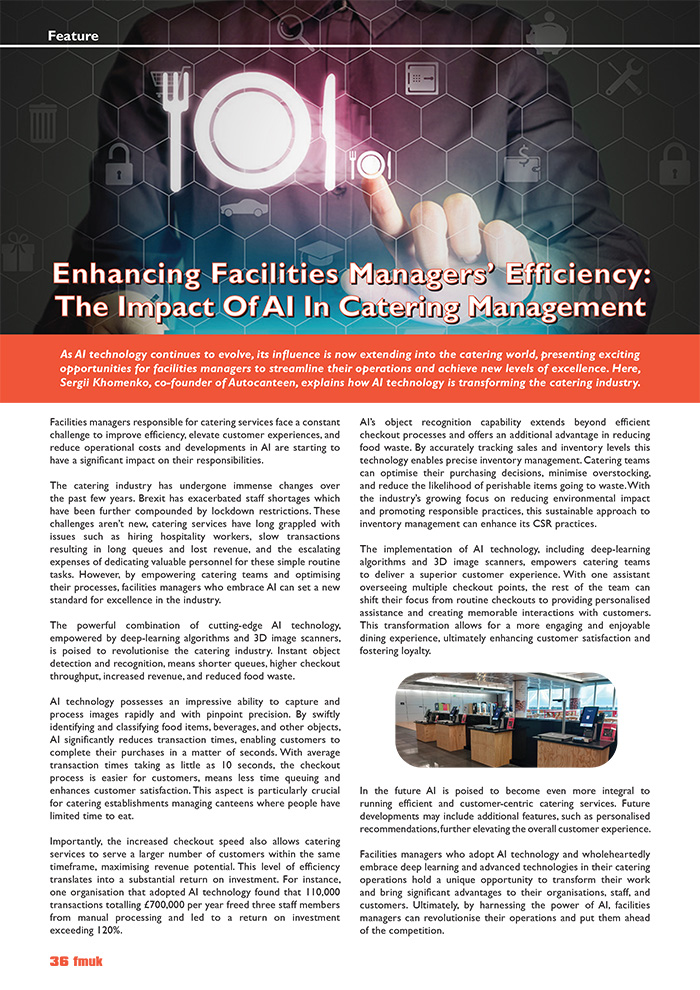Enhancing Facilities Managers' Efficiency: The Impact Of AI In Catering Management

Facilities managers responsible for catering services face a constant challenge to improve efficiency, elevate customer experiences, and reduce operational costs and developments in AI are starting to have a significant impact on their responsibilities.
The catering industry has undergone immense changes over the past few years. Brexit has exacerbated staff shortages which have been further compounded by lockdown restrictions. These challenges aren’t new, catering services have long grappled with issues such as hiring hospitality workers, slow transactions resulting in long queues and lost revenue, and the escalating expenses of dedicating valuable personnel for these simple routine tasks. However, by empowering catering teams and optimising their processes, facilities managers who embrace AI can set a new standard for excellence in the industry.
The powerful combination of cutting-edge AI technology, empowered by deep-learning algorithms and 3D image scanners, is poised to revolutionise the catering industry. Instant object detection and recognition, means shorter queues, higher checkout throughput, increased revenue, and reduced food waste.
AI technology possesses an impressive ability to capture and process images rapidly and with pinpoint precision. By swiftly identifying and classifying food items, beverages, and other objects, AI significantly reduces transaction times, enabling customers to complete their purchases in a matter of seconds.
With average transaction times taking as little as 10 seconds, the checkout process is easier for customers, means less time queuing and enhances customer satisfaction. This aspect is particularly crucial for catering establishments managing canteens where people have limited time to eat.
Importantly, the increased checkout speed also allows catering services to serve a larger number of customers within the same timeframe, maximising revenue potential.
This level of efficiency translates into a substantial return on investment. For instance, one organisation that adopted AI technology found that 110,000 transactions totalling £700,000 per year freed three staff members from manual processing and led to a return on investment exceeding 120%.
AI's object recognition capability extends beyond efficient checkout processes and offers an additional advantage in reducing food waste. By accurately tracking sales and inventory levels this technology enables precise inventory management. Catering teams can optimise their purchasing decisions, minimise overstocking, and reduce the likelihood of perishable items going to waste.
With the industry's growing focus on reducing environmental impact and promoting responsible practices, this sustainable approach to inventory management can enhance its CSR practices.
The implementation of AI technology, including deep-learning algorithms and 3D image scanners, empowers catering teams to deliver a superior customer experience. With one assistant overseeing multiple checkout points, the rest of the team can shift their focus from routine checkouts to providing personalised assistance and creating memorable interactions with customers.
This transformation allows for a more engaging and enjoyable dining experience, ultimately enhancing customer satisfaction and fostering loyalty.
In the future AI is poised to become even more integral to running efficient and customer-centric catering services. Future developments may include additional features, such as personalised recommendations, further elevating the overall customer experience.
Facilities managers who adopt AI technology and wholeheartedly embrace deep learning and advanced technologies in their catering operations hold a unique opportunity to transform their work and bring significant advantages to their organisations, staff, and customers.
Ultimately, by harnessing the power of AI, facilities managers can revolutionise their operations and put them ahead of the competition.



























































